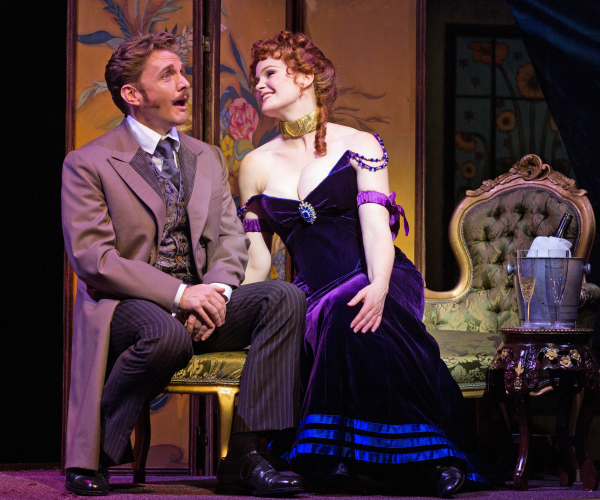Can-Can
Parisian dance halls of the 1890s get a makeover for this revamped Cole Porter revival at Paper Mill Playhouse.

(© Matthew Murphy)
"Money spent on pleasure is never a waste," says La Mome Pistache, our bawdy dance hall hostess from Montmartre. This air of unapologetic gaiety is precisely what breathes such joyful life into Paper Mill Playhouse's indulgent revival of Can-Can — a production with its eyes on a Broadway run later this season.
Broadway vets Jason Danieley and Kate Baldwin lead an extraordinary company of dancers and musical-theater hams as the rules-obsessed Judge Aristide Forestier and his former love from the other side of the tracks, Pistache (known in her younger days as Mathilde). The classic Cole Porter score, featuring a roster of numbers ranging from the sultry "I Love Paris" to the comic "Every Man Is a Stupid Man," could not have found two more beautiful voices to pick up the old chestnut. Despite a dated premise, the piece has significantly fewer cobwebs thanks to book writer and director David Lee and his coauthor Joel Fields, who have revamped Abe Burrows' original work.
The show opens in Pistache's lush Parisian dance hall, designed by Rob Bissinger with an aesthetic of decadence fit for all kinds of patrons, from the social elite to the local drunk. However, baser tastes prevail in this homegrown establishment, drawing audiences with the promise of high kicks and bloomers — and perhaps even more when the "Can-Can Supreme" is on the bill. Measured against today's standards of obscenity, the sights at the Bal du Paradis are hardly scandalous enough to make even the most conservative audiences blush. In 1893, however, fishnet stockings and lacey underwear are enough to induce legal action, especially when Paris' most stalwart judge is on the bench. After Aristide discovers his old flame is at the helm of this den of iniquity, the pair engages in a cat-and-mouse game of she-loves-me-she-loves-me-not, with Pistache's business and Aristide's professional reputation hanging in the balance.
Baldwin and Danieley make for a winning pair of star-crossed lovers, even as their characters' thick emotional walls keep them stubbornly estranged. Beyond Pistache's sexual posturing and Aristide's rigid principles, the two find an endearingly subdued chemistry as a couple of first loves reunited.
Nowhere else in this production of Can-Can, however, is the word subdued applicable. In the tradition of old-fashioned musical comedy, Lee's actors camp up the suggestive jokes, some landing better than others. He brings the quick wit and theatricality he famously lent to the hit television series Cheers and Frasier, much of which aptly translates to the stage, though there are jokes that still struggle to fill the Paper Mill proscenium. His supporting cast is luckily filled with some of the most talented comic performers in the business. Greg Hildreth is an infinitely charming deadbeat artist as no-talent sculptor Boris Adzinidzinadze, whose cumbersome name is the least of his professional obstacles. Despite his many faults, he has managed to win the heart of aspiring dancer Claudine, played by the luminous Megan Sikora, whose effortless comedic presence heightens the effect of her stunning moments dancing in the Bal du Paradis spotlight. She shares an electric dance with Michael Berresse, who, as a Tony-nominated Kiss Me, Kate alum, enjoys a comfortable Cole Porter reunion, this time as the despicably predatory art critic Hilaire Jussac.
The production is filled to the brim with entertaining numbers, some of them unfortunately dwindling in charm as time ticks on while the plot remains at a standstill. But choreographer Patti Colombo's staging for the showstopping can-can in Act 1 — which additionally showcases the graceful movement of Ann Hould-Ward's intricately crafted Parisian costumes — is worth every lumbering moment that sporadically rears its ugly head. Storytelling blends seamlessly with athleticism, artistry, and unadulterated entertainment, which, at its core, "C'est Magnifique."








